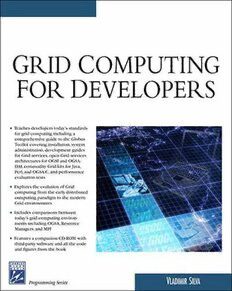
Grid computing for developers PDF
576 Pages·2005·3.088 MB·English
Most books are stored in the elastic cloud where traffic is expensive. For this reason, we have a limit on daily download.
Preview Grid computing for developers
Description:
Learn the Future of Computing Today! Many industry analysts believe that Grid computing will be the next big wave in technology. It is so promising that major technology companies such as IBN, Microsoft, Oracle, and Sun are allocating significant quantities of resources for Grid research and development. A Developer’s Guide to Grid Computing explores the evolution of Grid computing from the early distributed computer paradigm to the modern Grid environments. Most of today’s Grid environments will be examined including OGSA, Resource Managers, and MPI. The book also explores today’s de facto standards for Grid computing including a comprehensive guide to the Globus Toolkit for developers covering installation, system administration, development guides for Grid services, open Grid services architectures for WSRF, commodity Grid kits for Java, Perl, and OGSA-C, and performance evaluation tests. A significant amount of source code samples accompanies each chapter. A Developers Guide to Grid Computing is an ideal resource for computer scientists and researches, graduate students, and IT professionals looking to further expand their Grid Computing skills. Key Features: * Teaches developers today’s standards for Grid computing * Provides a comprehensive guide to the Globus Toolkit for developers covering installation, system administration, development guides for Grid services architectures, Web Services Resource Framework (WERF), commodity Grid kits for Java, Perl, and OGSA-C, and performance evaluation tests * Explores the evolution of Grid computing from the early distributed computing paradigm to the modern Grid environments * Includes comparisons between today’s Grid computing environments (OGSA, WSRF) and parallel APIs, such as MPI * Features a companion CD-ROM with all the code and figures from the book On the CD-ROM! * Projects: Contains all the code from examples covered in the book by chapter * Images: Contains all the images in the book, in color, by chapter System Requirements: Windows NT, Windows 2000, or Windows XP Pro; Websphere Studio Application Developer (WSAD) v 5.1 with Portal Toolkit is recommended; Pentium II Processor or greater; CD-ROM drive; Hard drive; 128MB of RAM, minimum 256 recommended; 20MB of hard drive space for the code examples.
See more
The list of books you might like
Most books are stored in the elastic cloud where traffic is expensive. For this reason, we have a limit on daily download.
